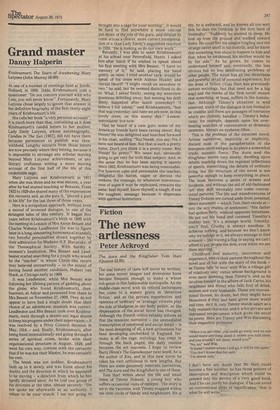Fiction
The new • artlessness
Peter Ackroyd
The Aura and the Kingfisher Tom Hart (Quartet £3.95)
The real history of taste will never be written, but some recent images and diversions have become frequent enough to make a whole sub-genre in this fashionable metropolis. As the middle-class novel with its refined techniques has come to a watery grave in 'detective fiction,' and as the private experiences and opinions of 'ordinary' or 'average' citizens play the role of bludgeon in our body politic, so the dispensation of the social novel has changed. Although the French critics reliably inform us that the innocent narrative — the unmediated transcription of emotional and social detail — is the most designing of all, a new artlessness has been developing unchecked in England. Demotic is all the rage; sociology has crept in through the back pages; the daily routine becomes the art nouveau. I hope to review Barry Hines's The Gamekeeper next week; he is the author of Kes, and in this new novel he takes his own artfulness to new lengths. But there are some genuinely innocent narratives, and The Aura and the Kingfisher is one of them.
Tom Hart writes about the life and small times of Timmy Dobson, a young boy who suffers occasional visits of epilepsy. The story is set in the 'twenties, with Timmy trapped within the little circle of family and neighbours. He is shy, he is awkward, and he knows all too well that he does not conform to the iron laws of 'normality': "Suddenly he wanted to sleep. He rose up from the ground and walked toward home. He could feel his tongue tingling and the strange sweet smell in his nostrils, and he knew that something was about to happen to him and that, when he awakened, his mother would be by his side." As he grows, he comes to understand himself and, eventually, the less obvious but no less debilitating problems of other people. The novel has all the directness and powerful detail of personal experience, but the dress of fiction (Tom Hart has previously written sociology, but that need not be a big leap) and the marks of the 'first novel' ensure that something, at least, suffers in the translation. Although Timmy's situation is well observed, much of the dialogue is too formal to be credible and there are passages of narrative which are clumsily handled — Timmy's behaviour, for example, depends upon his overhearing snatches of conversation at dramatic moments. Always an eyebrow-lifter.
This is the problem of the innocent novel. Artless narratives, implicitly or explicitly, discard most of the paraphernalia of the bourgeois novel and put in its place a somewhat crude, mimetic force. The Aura and the Kingfisher moves very slowly, dwelling upon details, marking down the regional inflections of speech, transcribing the details of ordinary living, but the structure of the novel is not powerful enough to keep everything in place. The book becomes a series of scenes and incidents, and without the aid of old-fashioned 'are they drift inevitably into some conventional patterns. The life and misadventures of Timmy Dobson are turned aside from personal, direct statement — which Tom Hart excels at — into the airy realms of sentiment: "His father had spoken flatly, without apparent bitterness. He put out his hand and caressed Timothy's stubbly hair. 'It's a strange world, Timothy, you'll find. Cruelty is always needless. It achieves nothing, and because we don't know why we indulge in it, we always manage to find a reason — like waving a flag or saying we can't afford to pay people the dole, even when we see them starving.'"
Childhood and maturity, innocence and experience, weave their pattern throughout the novel and all but stifle the story of the book -as Timmy falls 'in love' with Win, a village girl of relatively easy virtue whose background is even more damning than Timmy's, and as he involves himself in the affairs of Jack Cams, his neighbour and friend who falls foul of drink, women and irate husbands. These are conventional themes, no doubt, but they might have blossomed if they had been given more world and time. As it is, only Timmy stands apart as a fully realised character, and it is his private and 'distressed temperament which gives the novel its power. Here are Timmy and Win discussing their respective problems:
"When you are older, you could go away and no one would know anything about it unless you told them, and you wouldn't tell them, would you?"
"No, no," said Win.
"It doesn't matter where! will go, it will be the same." "You don't know that for sure."
"I'm almost sure,"
I don't have any doubt that Mr Hart could become a fine novelist; he has those powers of observation and description which could be pressed into the service of a very good book. And if he can purify his dialogue, if he can avoid all conventional ideas of 'significance,' that is what he will write


































 Previous page
Previous page